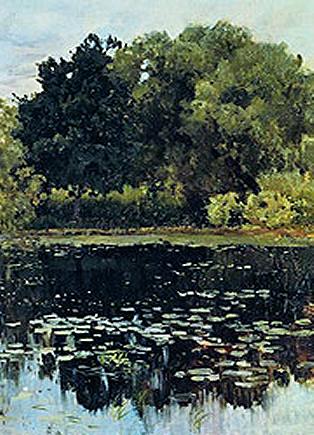Count Alexy K. Tolstoy (1817-75), a distant cousin of the famous novelist,
was a many-sided and versatile poet and playwright. {1-2} After Derzhavin, he was the greatest exponent of the grand manner, but also the writer
of the best nonsense verse in Russian. Mirsky calls him the least disharmonious of Russian poets, but also in every respect a gentleman,
with a clean and noble expression in all he produced. Bristol calls him the guardian of German romantic idealism, committed to transcendental
beliefs and seeing the world as an unending struggle between good and evil.
Alexy Tolstoy was also a wealthy aristocrat who, after an education at Moscow university, was appointed to the Foreign Office and served in Frankfurt from 1837 to 1840.
He retired to his estate in 1861, and in 1863 married Sofia Miller, the inspiration for many of his poems. His first play, 'The Death of Ivan the Terrible' appeared in 1866,
and his first collection of poems in 1867, but Tolstoy had already made a name for himself with comic poems, parodies and wonderfully senseless lyrics.

Tolstoy wrote many narrative poems and ballads, often incorporating his nostalgic views of the past, his
political beliefs and, in later life, his religious and philosophical persuasions. His plays and novels were
popular in the 1860s, but the poetry less so.
The problem was the facility with which he wrote, and the absence of a discriminating audience to keep him from writing too close to cliché,
but the best of his work kept the lyric alive for later generations.
Ты помнишь ли, Мария...
Ты помнишь ли, Мария,
Один старинный дом
И липы вековые
Над дремлющим прудом?
Безмолвные аллеи,
Заглохший, старый сад,
В высокой галерее
Портретов длинный ряд?
Ты помнишь ли, Мария,
Вечерний небосклон,
Равнины полевые,
Села далёкий звон?
За садом берег чистый,
Спокойный бег реки,
На ниве золотистой
Степные васильки?
И рощу, где впервые
Бродили мы одни?
Ты помнишь ли, Мария,
Утраченные дни?
1840
The TTS Audio Recording is:
The poem is in trimeters rhymed AbAb:
Ты по́мнишь ли, Мари́я, 3A
Оди́н стари́нный дом 3b
И ли́пы вековы́е 3A
Над дре́млющим прудо́м? 3b
'Do You Remember, Maria' is a pretty little piece of nostalgia is made difficult for translators by the tight rhyming on short lines.
Ruverses have only
the one rendering, an accomplished version (as always) by C.M. Bowra. I give his first two stanzas:
Do you remember, Mary,
A house of bygone times,
And round a pond that slumbered
The immemorial limes?
The overgrown old garden.
The silent walks and trees,
The lengthy row of portraits
Beneath the hall’s high frieze?
We probably need something today with a slightly more idiomatic ring:
Do you remember, Mary,
that house of former times,
the sleeping pool and airy
stands of ancient limes?
How silent the alley-ways,
the garden's neglected air,
and in the long gallery the gaze
of high-hung portraits there?
Mary, do you remember
with skies at evening time
a softly glowing ember,
how distant bell would chime?
Behind the garden view
how clear the stream would flow,
how gold was corn, how blue
the cornflower steppes would show?
The wood where we together
first on our own would go?
Mary, do you remember
the days flown long ago?
1. Mirsky, D.S., A History of Russian Literature (Knopf 1926 / Vintage Books 1958) 232-4.
2. Bristol, E., A History of Russian Poetry (O.U.P.) 147-50.
Russian poem translations on this site: listing.